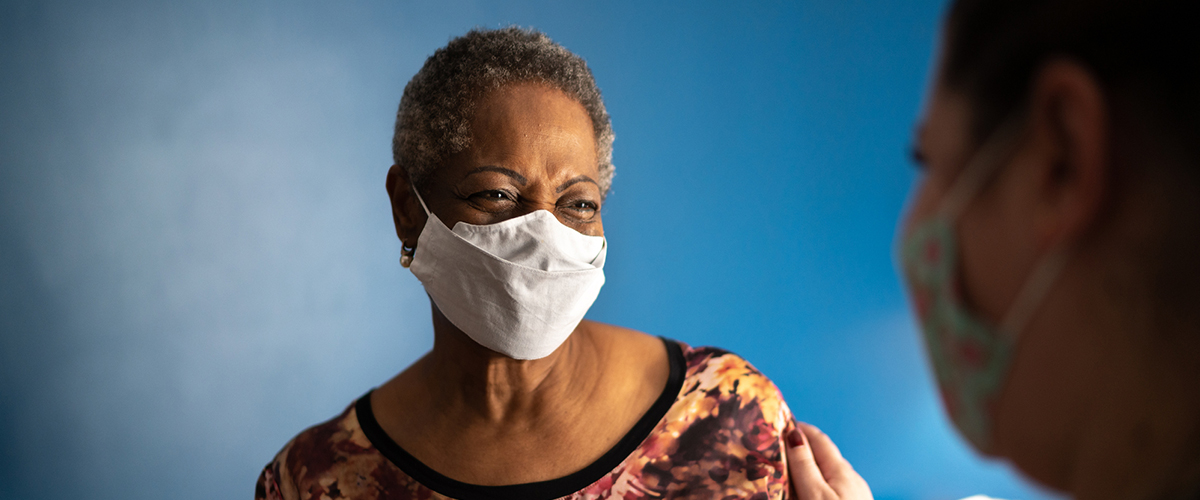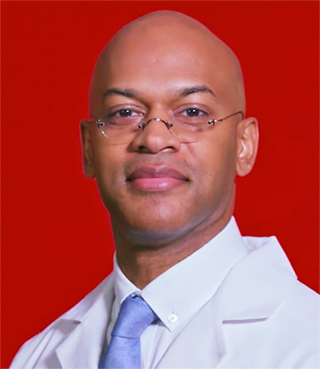Colorectal Cancer and Its Impact on the Black Community
This Colorectal Cancer Awareness Month, a leading expert shares important tips for Black patients about their colon health.

Colorectal cancer strikes the Black community at a higher rate than any other ethnic group in the United States, according to the American Cancer Society: African Americans are about 20% more likely to get colorectal cancer and about 40% more likely to die from it.
Colorectal cancer is the third most commonly diagnosed cancer in both men and women in the U.S. While it’s rising in young people across ethnicities, the cancer tends to be more aggressive if you’re Black, according to Dr. Carl Crawford, a gastroenterologist at NewYork-Presbyterian/Weill Cornell Medical Center.
“There are a number of factors that may go into why African Americans in particular have higher rates of [colorectal] cancer,” says Dr. Crawford, who is also an assistant professor of clinical medicine in the Division of Gastroenterology and Hepatology at Weill Cornell Medicine. “We don’t understand all of the genetics, but we do know that there are socioeconomic factors involved, such as the kinds of diet that are present in disadvantaged communities and not enough access to health care for certain kinds of symptoms and triggers that would lead you to see a doctor.”
Dr. Crawford, who is committed to improving communication with disadvantaged communities about their health, spoke to Health Matters about why these disparities exist, the body’s “alarm bells” for colorectal cancer, and ways Black patients can maintain colorectal health.
Get screened.
The American Cancer Society recommends that people of average risk start regular screening at 45. Although there are several screening tests available, Dr. Crawford says that the colonoscopy is the gold standard and people should get one at the recommended time.

Dr. Carl Crawford
“An abnormal exam will save someone’s life, because you’ve uncovered something that had the potential to become colorectal cancer,” he says. Other screening exams, like stool tests, tend to uncover something only if an advanced lesion or cancer is already there, while colonoscopies can detect and remove growths called polyps in the colon and rectum before they have a chance to become cancer. But patients should be aware that there are many screening options, since any exam is better than none.
Dr. Crawford recognizes it takes time to arrange and prepare for a colonoscopy. The day before, patients should only drink clear liquids, including a preparation with electrolytes (usually a powder dissolved in water). This will help cleanse the gastrointestinal tract so that the doctor can clearly see the lining of the colon with a flexible camera. “Because sedation is used to make patients 100% comfortable for the exam, individuals should refrain from work activities after their procedure and should not make any big decisions that day,” advises Dr. Crawford. The patient also needs to coordinate having someone take them home safely after the procedure because the medicines will not totally leave the body for several hours. However, he says, “The procedure is well tolerated and not as bad as people may think.”
While there is some inconvenience to it, if the results are normal after a routine colonoscopy, another exam isn’t required for 10 years. If there is a family history of colon cancer or the exam finds colon polyps (depending on the size of the growths or if other symptoms develop), another exam within the next one to five years is necessary.
Dr. Crawford urges Black patients to discuss their risk with a doctor and be proactive about getting screened. Those with a family history of colorectal cancer also should consider getting their first colonoscopy 10 years before the earliest onset of anybody in the family. For example, if someone in your family got colon cancer at 45, you should be screened at 35. Otherwise, start screening at 45.
Trust your gut.
“The body has certain alarm signals,” says Dr. Crawford. Even if you are not yet 45, listen to your body; see a doctor and consider a colonoscopy if something doesn’t feel right. Symptoms to watch for include a change in bowel habits that lasts more than a few days; a feeling you need to have a bowel movement that’s not relieved by having one; rectal bleeding; blood in the stool; abdominal cramping; feeling tired or weak; or losing weight without trying.
Dr. Crawford knows from personal experience the importance of making your concerns heard. “My dad had bleeding and was told, ‘Don’t worry about it, it’s probably a hemorrhoid,’” he says. “My dad died from colon cancer, which is how I ended up doing this work. I believe I can make a difference for people that are in his situation.”
Dr. Crawford acknowledges the varying degrees of medical mistrust within Black communities, and the history behind it. But he’s working to make sure people know that colonoscopies are safe and recommended for everyone.
“Some patients don’t trust coming in for certain exams and tests, but I think a lot of it comes down to communication — listening to their concerns and talking to them to make sure they have the right information,” he says. “If colorectal cancer is caught early, it can be treated. An exam is worth it.”
Cultivate a healthy lifestyle.
While genetics play a role, “the more we live unhealthy lifestyles, the greater the risk of developing something like a polyp that will become a tumor or a cancer,” says Dr. Crawford. Particularly if you have a family history of colorectal cancer, it’s important to take control of your health. Here are the factors that Dr. Crawford highlights:
Diet and exercise: One of the best things you can do to reduce the risk of disease overall is to follow a good diet and exercise regularly. “Among other things, diet and exercise decrease your risk for diabetes, and diabetes in particular may carry a higher risk for the development of cancers because high levels of insulin, which is a growth factor, can fuel the growth of abnormal cells,” says Dr. Crawford.
Research shows a link between diet and colorectal cancer. Avoid highly processed foods and opt for brightly colored fruits and vegetables instead. “Food additives, like fragrances, flavorings, and preservatives, have been shown to do a couple of things inside of the GI tract, like alter normal gut bacteria and fuel the growth of tumors,” says Dr. Crawford.
Smoking: Don’t smoke. “Cigarettes or tobacco is like an accelerant to a fire,” says Dr. Crawford. “There are an unknown number of carcinogens that are in that kind of smoke that can damage DNA and alter the course of a damaged cell.”
Sleep: Dr. Crawford emphasizes the importance of sleep and giving your body time to power down after eating. “Eating before bed increases certain kinds of hormones that are responsible for digestion rather than shifting them to those of a repair state,” he says. “Most of your body’s ability to repair itself happens in deep sleep. Eating too close to sleep alters the normal hormonal balance and circadian rhythms that are needed for the body to repair itself.”
If colorectal cancer is caught early, it can be treated. An exam is worth it.
Dr. Carl Crawford
Talk to your doctor.
Dr. Crawford is working with his colleague Dr. Andrea Betesh, also a gastroenterologist at NewYork-Presbyterian/Weill Cornell Medical Center and assistant professor of medicine in the Division of Gastroenterology and Hepatology, on a project that aims to empower patients and provide the information they need about colorectal cancer, screenings, and colorectal health in a simple, streamlined format. Leveraging information technology, they’re working to identify and reach out to patients in the health care system who are eligible for screening but may not be aware. They are also working with the Division of Gastroenterology and the Department of Medicine to streamline access to all of the available colorectal cancer screening tests.
“We need to reach out to the population that’s outside our walls and increase access to our care,” says Dr. Crawford. “I want every single patient to be cared for and supported.”
His most important message: “If it’s time, please get screened.”
Learn more about treating colorectal cancer at NewYork-Presbyterian.
Carl Crawford, M.D., is an attending physician at NewYork-Presbyterian/Weill Cornell Medical Center in the Division of Gastroenterology and Hepatology and assistant professor of medicine at Weill Cornell Medicine. His focuses include gastrointestinal tumors, bleeding, and infections.
